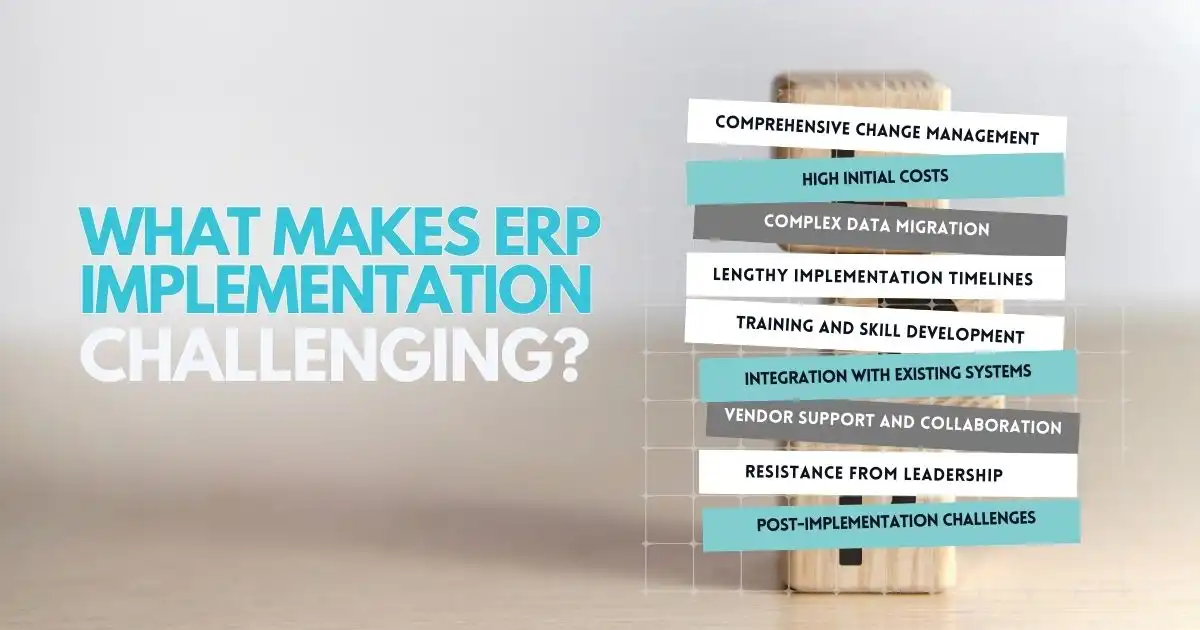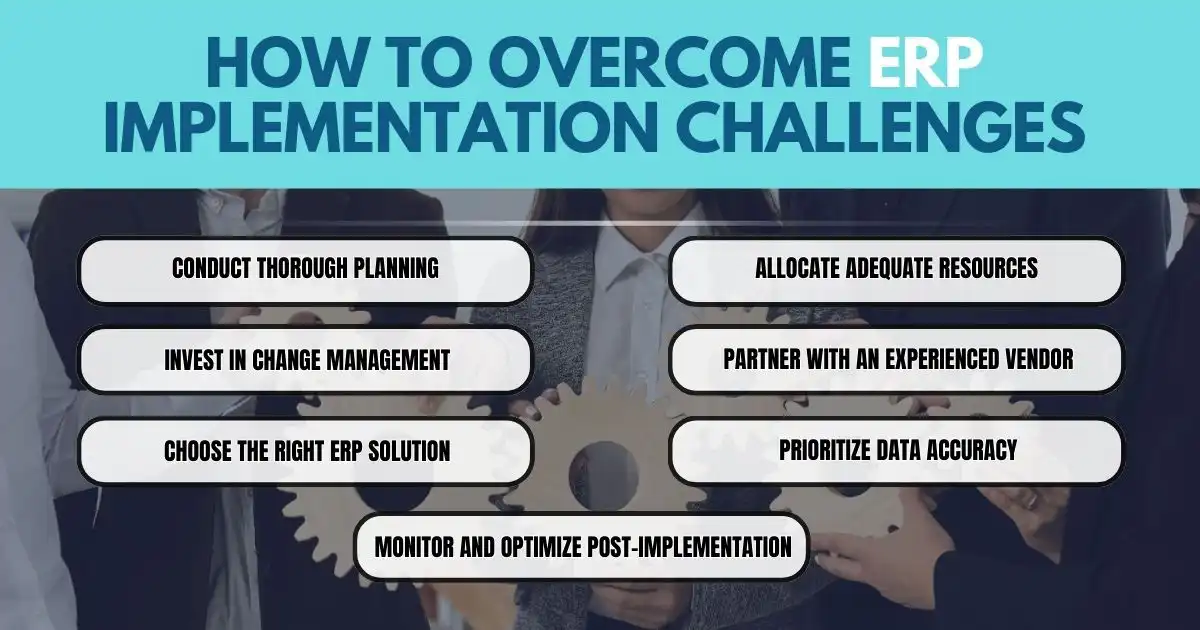Enterprise Resource Planning (ERP) implementation is a transformative step for businesses aiming to integrate and streamline their operations. However, the process is far from simple. ERP systems affect every department, altering workflows and introducing new challenges.
This blog will explore why ERP implementation is such a complex process and provide practical insights to help businesses navigate it.
What is ERP?
ERP is software designed to streamline and automate essential business processes across different departments like finance, HR, supply chain, and manufacturing. By bringing all these functions into one system, ERP gives organizations a complete picture of their operations, making it easier to make informed decisions and work more efficiently.
What Makes ERP Implementation Challenging?

Implementing an ERP system is like renovating the foundation of a building while people are still working inside it. It demands careful planning, dedication, and a deep understanding of the business’s unique requirements. Here are the main reasons why ERP implementation can be so challenging:
Comprehensive Change Management
Implementing an ERP system isn’t just about adopting new software, it’s about changing how your business operates. Employees must adapt to new workflows, and resistance to change is common. Without proper change management strategies, the transition can lead to low adoption rates and system inefficiencies.
High Initial Costs
ERP systems require a significant upfront investment. These costs include software licenses, hardware upgrades, training sessions, and hiring external consultants. Small and medium-sized businesses often struggle to allocate the necessary resources.
Complex Data Migration
Transitioning from legacy systems to an ERP platform is no small feat. Data migration is a complex process that demands careful planning to prevent problems like incompatible formats, errors in data structure, or the loss of essential information. Taking the time to ensure the data is accurate, well-organized, and complete is essential for a seamless transition and the uninterrupted operation of your business.
Customization Requirements
Every business is unique, which means off-the-shelf ERP solutions often require customization. Tailoring an ERP system to match specific processes can increase costs and extend implementation timelines. Over-customization can also lead to system instability.
Lengthy Implementation Timelines
ERP implementations have a reputation for dragging on much longer than anyone expects. Delays are often caused by unforeseen technical issues, inadequate planning, or insufficient resources. Extended timelines can disrupt daily operations and test stakeholder patience.
Training and Skill Development
ERP systems come with steep learning curves. Employees need extensive training to understand and use the new system effectively. Lack of proper training can lead to errors, reduced productivity, and system underutilization.
Integration with Existing Systems
Integrating an ERP system with existing software and tools can be a trial. Compatibility issues, interface challenges, and disruptions in data flow are common problems. Seamless integration is crucial to ensure operational continuity.
Vendor Support and Collaboration
Choosing the right ERP vendor is as important as the implementation itself. Poor communication, limited support, or lack of expertise from the vendor’s side can derail the entire process. A reliable and experienced vendor makes all the difference.
Resistance from Leadership
Support from top management is crucial for ERP implementation. Resistance or lack of involvement from leadership can create roadblocks, delay decisions, and reduce employee morale.
Post-Implementation Challenges
Even after the system goes live, businesses often face challenges like system bugs, performance issues, and user adaptation. Continuous monitoring and optimization are required to ensure long-term success.
How to Overcome ERP Implementation Challenges

While ERP implementation is tough, businesses can follow these strategies to mitigate challenges and improve success rates:
Conduct Thorough Planning
Create a detailed implementation roadmap that outlines timelines, roles, and responsibilities. Anticipate potential challenges and devise contingency plans.
Invest in Change Management
Prepare your team for change through communication, training, and continuous support. Highlight the benefits of ERP adoption to gain employee buy-in.
Choose the Right ERP Solution
Select a solution that aligns with your business needs and industry requirements. Avoid over-customization to maintain system stability.
Allocate Adequate Resources
Ensure sufficient budget, skilled personnel, and technological resources are in place before starting the implementation process.
Partner with an Experienced Vendor
Collaborate with a vendor known for providing robust solutions and reliable support. Conduct thorough vendor evaluations before finalizing your choice.
Prioritize Data Accuracy
Dedicate time and resources to clean and validate data before migration. Test the migrated data extensively to ensure accuracy.
Monitor and Optimize Post-Implementation
Set up a dedicated team to monitor system performance and address any issues. Regularly listen to user feedback to make meaningful improvements to the system.
From Obstacles to Opportunities
ERP implementation is more than just installing new software—it’s about improving how your business works at its core. Despite challenges like high costs and data migration, these hurdles offer opportunities to build a stronger foundation. With careful planning and a dedicated team, you can fully realize the value of your ERP system.
Success comes from preparation, adaptability, and strong leadership. Train your staff thoroughly, work with reliable partners, and maintain clear communication throughout the process. Each challenge you conquer paves the way for a more resilient and efficient business.
Think of ERP implementation as building a bridge to a brighter future. It takes effort and patience, but the rewards—better processes, smarter decisions, and long-term success—make it worth the journey.
The question is, are you ready to build that bridge and take your business to the next level?
FAQs
Why is ERP implementation important for businesses?
ERP implementation centralizes and streamlines business processes, improving efficiency, collaboration, and decision-making.
How long does ERP implementation take?
The timeline varies depending on the complexity of the business and the ERP system but typically ranges from several months to over a year.
Can small businesses benefit from ERP systems?
Yes, ERP systems are scalable and designed to meet the specific requirements and budgets of small businesses.
What is the cost of ERP implementation?
Costs vary widely but typically include software licenses, hardware upgrades, training, and consultant fees. Planning and budgeting are essential.
